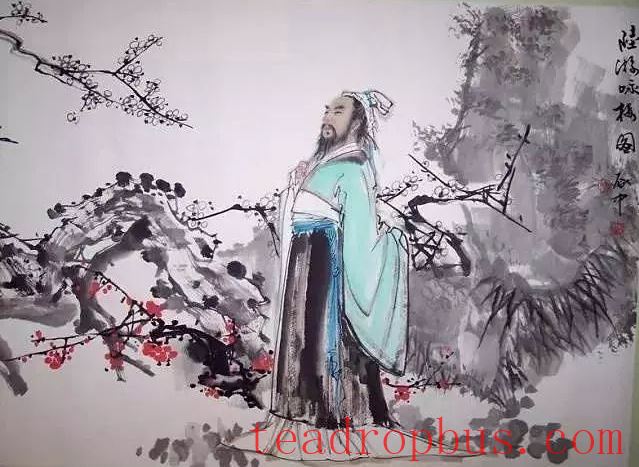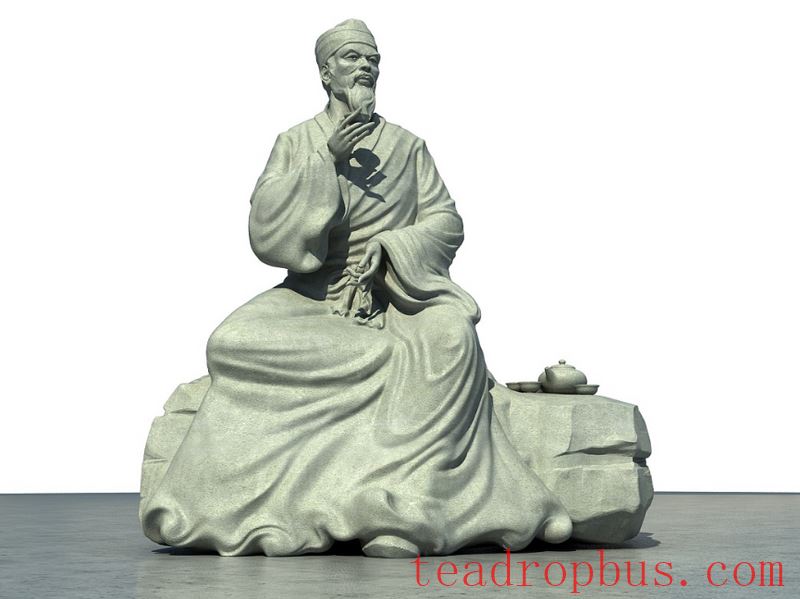“Ten thousand poems in sixty years,” Lu You was one of the foremost poets of the Song Dynasty. When it comes to tea poetry, he is an indispensable figure, standing as a splendid cultural milestone in the history of Chinese Tea poetry.
Lu You was born into a prominent family; both his parents were from influential clans. He received a fine education from a young age and took the imperial examination administered by the Ministry of Rites during the reign of Emperor Gaozong but was dismissed by Qin Hui. In middle age, he traveled to Shu (Sichuan), leading a military life, and in his later years, he retired to his hometown.
Born in a Tea Region
Lu You was born in Shanyin (present-day Shaoxing, Zhejiang), a region known for its tea culture. From a young age, he was immersed in the tea-drinking culture. Mount Kuaiji was famous for producing Rizhu tea, and Lu You had a particular fondness for his hometown's teas, with Rizhu tea being at the top, followed by olive tea and Dingkeng tea, all of which found their way into his poetic works.
He spared no effort in praising his hometown's fine teas in his poetry. One good example is the poem “The Water of a Small Pond Before the Three Caves Is Very Unique, Suitable for Boiling Tea”:
The mossy path is slippery in my straw sandals, but it doesn't matter; I can rest on a stool by the pond. The rock formations reflect the peaks and ridges, while the distant ravine carries the scent of medicinal Herbs. The water drawn fills the bottle like milk, white and pure, and as it flows over the stones, it produces a long, tinkling sound. The Rizhu tea from my bag is renowned worldwide, and it should only be tasted with the finest spring waters.
Throughout his life, Lu You traveled extensively across the country, visiting many scenic spots and trying the local teas wherever he went, leaving behind numerous poems praising famous teas.
In his poem “Snow in the Jianxi River,” Lu You wrote:
“The official tea of Jianxi is unparalleled in the world; its flavor and aroma are best enjoyed with a light snow.”
When the poet received Jian tea as a gift from a friend, he was naturally delighted and quickly brewed it. After drinking, the tea's fragrance and taste lingered in his mouth for an entire day, leaving him wide awake. To honor his friend's kindness, he took a brazier to the bamboo grove to savor the tea. His affection for Jian tea is evident in his words.
Serving as a Tea Official
Lu You served as a tea official in Fujian, responsible for overseeing tea affairs in Changping, Fujian, with his office located in Jianzhou (present-day Jian'ou, Fujian). He held this position for more than ten years. Coincidentally, this period coincided with the peak of Jian tea production. There were over a thousand tea factories alone, and the court discontinued the tribute of Yangxian tea in favor of Jian tea. At that time, there were 32 official tea kilns responsible for producing tribute tea, and they were innovative, producing over 51 different varieties.

As a tea official, Lu You naturally benefited from his position. He had a particular love for Jian tea, which he expressed in his poetry:
Green fields, a furrowed bowl, and milky-white tea; there's no harm in saying I came to Fujian. Thinking back, what would have been the perfect thing to help me sober up? The first spring tea from Heluan in Longxing. The small dragon cakes were once reserved for the imperial court; now even the village of Huanxi gets to enjoy them. Even in the late spring, I can still see the flowers of Shaocheng; tasting the tea from Beiyuan in the snow. A cup of tea makes me feel better than when I first started drinking, but the tea leaves haven't yet reached the yellow stage after roasting.
In these poems, he lavishly praises the official tea of Jianxi, Beiyuan tea, small dragon cakes, and long eagle-claw tea, often lamenting that the great tea master Lu Yu never had the chance to taste these fine teas, which was indeed a regrettable matter.

As a tea official, he naturally had to sample teas, which imbued his poetry with the fragrances of various regional fruit teas. “There are more people from the Gorges than those from Chu, and earthen pots compete to Brew Chrysanthemum tea” (referring to chrysanthemum tea in Hubei); “When will we share a meal together, and boil some native tea with sweet chrysanthemums” (referring to chrysanthemum native tea in Sichuan); “I replace the cold spring water with calamus water and leisurely boil olive tea” (referring to olive tea in Zhejiang).
The teas of various regions can be glimpsed in Lu You's poetry, making him the paragon of literati who wrote about tea. Beyond simply describing the pleasure of Drinking Tea, his tea poems also use tea as a symbol to express his inner feelings.
For Lu You, tea was everything in life. “The tradition of mulberry and lingzhi remains strong, so I shall revise the tea classics once more.” Each of Lu You's tea poems became a chapter in a “revised tea classic.” His study of tea was a state of self-forgetfulness, an expression, an exploration, and also a reflection of his thoughts.
If there are any copyright issues, please contact us to remove them.